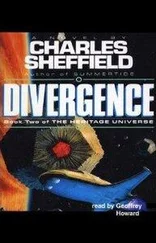“So there was a big problem, and no solution. Then in 1900 Max Planck showed that if you used a trick, you could get a curve that fitted the experiments for all wavelengths. It was a really odd trick, because to get the right answer you had to use a formula that would apply only if the energy radiating out of the box came in little discrete packages. Planck gave the package a name, a quantum, and he could calculate how big each quantum had to be. He found that it involved a new constant. Planck’s constant.”
“Wilmer, I heard all this thirty-odd years ago, and then I forgot it. Do I really need to hear it again?”
His high forehead furrowed. “Yeah. Of course you do. Otherwise I wouldn’t be saying it, would I?”
“Go on, then.” Celine had forgotten how impervious Wilmer was to distractions. “Just keep in mind that we can go to dinner as soon as we feel ready to eat it.”
“I’m ready now. I’ll speed up a bit. Everybody thought that what Planck did in 1900 was a mathematical trick, that it didn’t mean squat in the real world. Energy couldn’t really come in little bundles. Even if the method worked for some reason when you were dealing with radiation from a closed box, that wasn’t the way the rest of the world operated.
“But then Einstein took what Max Planck had done at face value. He explained the photoelectric effect by saying that light, and all radiation, interacted with matter as though the light was made up of quanta. If a quantum had enough energy, it would jar an electron loose from a surface that the light hit. If it didn’t have enough energy — if the wavelength of the light was too long — then no matter how intense the beam of light, there would be no release of electrons.”
“I’ve heard that before, too, and I’m getting hungry. Wilmer, what’s your point?”
“It’s this. Star made an assumption. We can go into details about what it is later; all I need to say at the moment is that it’s the same order of assumption that Planck made in 1900. Radical, and simple, and enough to make you drop your back teeth. Star can’t give you a justification for it, and neither can I, any more than Max Planck could. But with that assumption, and with nothing else that I didn’t already have in my theories, Star matched the recorded light curves from Alpha C, and the neutrino arrival pattern, and the gamma pulse profile. The lot, all at once, which was something I had never been able to do. And it’s something I would never have been able to do, nor would anyone else, if Star hadn’t made that leap of intuition.”
“That’s great.” Celine looked from Wilmer to Astarte, who was now basking in Wilmer’s praise. “I believe you, and I think it’s wonderful for both of you. And I’m glad to see you, Wilmer, anytime. But I don’t see why you had to come running over here to tell me this when you could just as easily have called.”
But did she know, or at least suspect? Celine recalled Astarte’s gasp when she mentioned the imminent end of the world. The bad thing about being a world-class worrier was that being right was worse than being wrong.
“No,” Wilmer said. “We absolutely had to come, as soon as we finished checking the calculations. Star’s theory says that one component of the particle flux released at the time of the supernova ought to be traveling a lot faster than the old theories predicted. So we have less time than we expected.”
Celine’s mind ran ahead, wondering about the rest of it. “When?”
“We’re not absolutely sure. We need the latest Sniffer data to determine accurate dates, and we don’t have it. Can you get that for us?”
“Yes. When will all this happen?”
“A big slug of particles could be here soon.”
“When?”
“Real soon. Months, maybe even weeks.” Wilmer leaned back and told Celine something she already knew better than he did. “Trouble is, the space shield you’re building can’t possibly be ready.”
Wilmer and Astarte added to Celine’s problems during dinner.
Meals were not optional events for Celine, even if the sky was falling. She had learned something during the disastrous return of the Mars expedition to Earth: Even when you were worried sick, even when you had zero appetite, even when you were so depressed that food felt like it stuck in your gullet, you had to eat.
First, though, Nick Lopez needed to know that the World Protection Federation — and the world — was in for bad news. Celine tried a quick call while Star went out to collect her and Wilmer’s luggage. The call turned out to be a wasted effort. On a planet where everyone could supposedly be reached at any time, Lopez did not answer. His whereabouts were stated as “unknown” by the staff of the World Protection Federation.
Celine didn’t believe that for a moment. They knew, but they weren’t telling. She left a message saying that she and Nick needed to talk on an urgent matter. After a moment she added the words highly sensitive. That ought to tickle Nick’s political curiosity.
As soon as Astarte had their luggage she would be conducted by the White House staff to the private dining room, where their meal should be waiting. As Celine and Wilmer headed that way she asked him how he had first heard of Astarte Vjansander.
“Out of the blue,” he said. “One day, five months ago, I got this package from the convent at Weipa, way up north on Albatross Bay.”
“You mean Star is a nun}”
“Gawdelpus, no. If Star’s a nun, Madame Curie ran a whorehouse. Star lived in the wild; she just used the convent as a mailing address and a place to beg free meals. Anyway, the envelope I received was full of pages of equations and drawings, all hand-written. I recognized the name Vjansander, it’s common in the territory, but I drew a blank with the name Astarte. At first I thought it had to be a man, because if a woman was given a name that sounded like ass and tarty put together, she’d change it soon as she could. Then during the tea break I found that Maria Greene and old Herbert Westerly had received copies of the same thing I had — all hand-written, must have taken ages. They’d looked at a few pages and found no sign of a proof for anything, so they’d chucked out the whole mess. I went back to my room, ready to follow their example, because there’s more nuts in the world than you can believe. It’s always the same old story: Einstein was wrong, Dirac didn’t understand what he was doing, Feynman was too simpleminded, Gottlieb missed the point. See, they always go after the big game in physics, and their own alternative ideas are always gibberish. It’s like Pauli says, most of the theories are so bad they’re not even wrong.”
They had reached the dining room and Astarte was not yet there. Celine walked over to the window and stared out at the night sky, looking to where Sky City would be, as Wilmer went on: “So I was all set to dump the papers into the trash. But I riffled through as I was ready to drop ’em, and I saw equations that I recognized at the bottom of a couple of the pages. One was the Klein-Nishina scattering formula, and the other was an old equation for something called an Emden polytrope, in an odd notation. That said we were in Eddington country. But the thing that struck me about what I was looking at wasn’t that those were new results — they were old, both of ’em — but that they were detailed. People with half-assed ideas always go grandiose, and they start by throwing overboard things like relativity or the conservation of energy. No sign of that here.
“So I glanced at a couple more pages and I saw variations on more things I recognized, like nucleosynthesis and stellar structure and stability. That’s when I cleared my desk, put my head down, and took a real good look.”
Читать дальше












